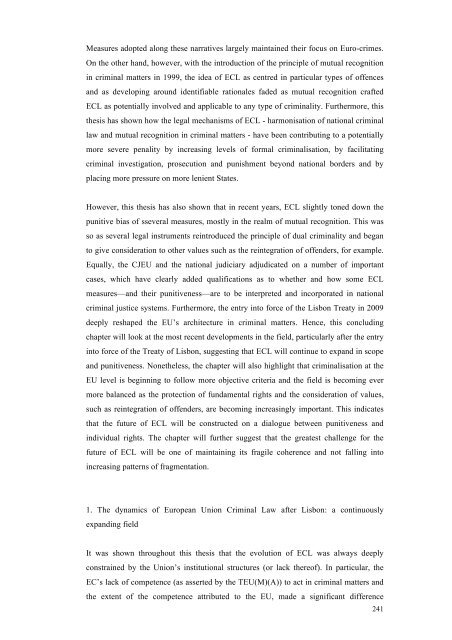The evolution of European Union criminal law (1957-2012)
The evolution of European Union criminal law (1957-2012)
The evolution of European Union criminal law (1957-2012)
You also want an ePaper? Increase the reach of your titles
YUMPU automatically turns print PDFs into web optimized ePapers that Google loves.
Measures adopted along these narratives largely maintained their focus on Euro-crimes.<br />
On the other hand, however, with the introduction <strong>of</strong> the principle <strong>of</strong> mutual recognition<br />
in <strong>criminal</strong> matters in 1999, the idea <strong>of</strong> ECL as centred in particular types <strong>of</strong> <strong>of</strong>fences<br />
and as developing around identifiable rationales faded as mutual recognition crafted<br />
ECL as potentially involved and applicable to any type <strong>of</strong> <strong>criminal</strong>ity. Furthermore, this<br />
thesis has shown how the legal mechanisms <strong>of</strong> ECL - harmonisation <strong>of</strong> national <strong>criminal</strong><br />
<strong>law</strong> and mutual recognition in <strong>criminal</strong> matters - have been contributing to a potentially<br />
more severe penality by increasing levels <strong>of</strong> formal <strong>criminal</strong>isation, by facilitating<br />
<strong>criminal</strong> investigation, prosecution and punishment beyond national borders and by<br />
placing more pressure on more lenient States.<br />
However, this thesis has also shown that in recent years, ECL slightly toned down the<br />
punitive bias <strong>of</strong> sseveral measures, mostly in the realm <strong>of</strong> mutual recognition. This was<br />
so as several legal instruments reintroduced the principle <strong>of</strong> dual <strong>criminal</strong>ity and began<br />
to give consideration to other values such as the reintegration <strong>of</strong> <strong>of</strong>fenders, for example.<br />
Equally, the CJEU and the national judiciary adjudicated on a number <strong>of</strong> important<br />
cases, which have clearly added qualifications as to whether and how some ECL<br />
measures—and their punitiveness—are to be interpreted and incorporated in national<br />
<strong>criminal</strong> justice systems. Furthermore, the entry into force <strong>of</strong> the Lisbon Treaty in 2009<br />
deeply reshaped the EU’s architecture in <strong>criminal</strong> matters. Hence, this concluding<br />
chapter will look at the most recent developments in the field, particularly after the entry<br />
into force <strong>of</strong> the Treaty <strong>of</strong> Lisbon, suggesting that ECL will continue to expand in scope<br />
and punitiveness. Nonetheless, the chapter will also highlight that <strong>criminal</strong>isation at the<br />
EU level is beginning to follow more objective criteria and the field is becoming ever<br />
more balanced as the protection <strong>of</strong> fundamental rights and the consideration <strong>of</strong> values,<br />
such as reintegration <strong>of</strong> <strong>of</strong>fenders, are becoming increasingly important. This indicates<br />
that the future <strong>of</strong> ECL will be constructed on a dialogue between punitiveness and<br />
individual rights. <strong>The</strong> chapter will further suggest that the greatest challenge for the<br />
future <strong>of</strong> ECL will be one <strong>of</strong> maintaining its fragile coherence and not falling into<br />
increasing patterns <strong>of</strong> fragmentation.<br />
1. <strong>The</strong> dynamics <strong>of</strong> <strong>European</strong> <strong>Union</strong> Criminal Law after Lisbon: a continuously<br />
expanding field<br />
It was shown throughout this thesis that the <strong>evolution</strong> <strong>of</strong> ECL was always deeply<br />
constrained by the <strong>Union</strong>’s institutional structures (or lack there<strong>of</strong>). In particular, the<br />
EC’s lack <strong>of</strong> competence (as asserted by the TEU(M)(A)) to act in <strong>criminal</strong> matters and<br />
the extent <strong>of</strong> the competence attributed to the EU, made a significant difference<br />
241
















